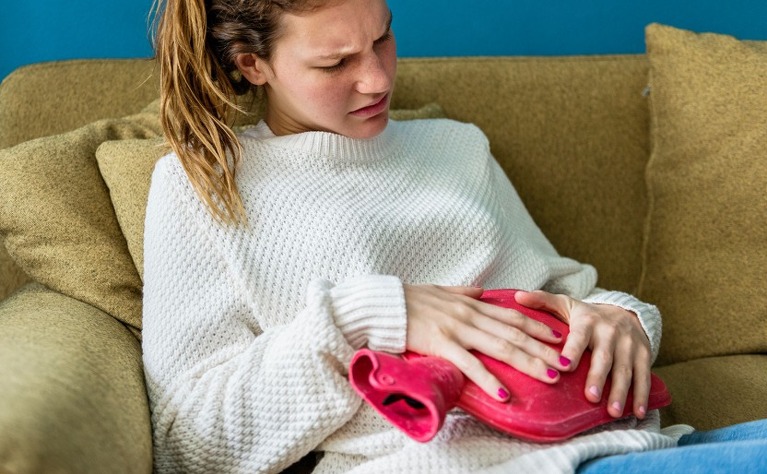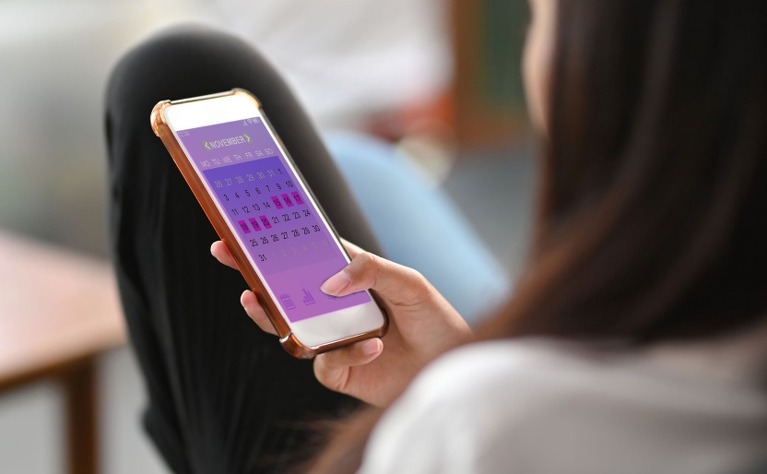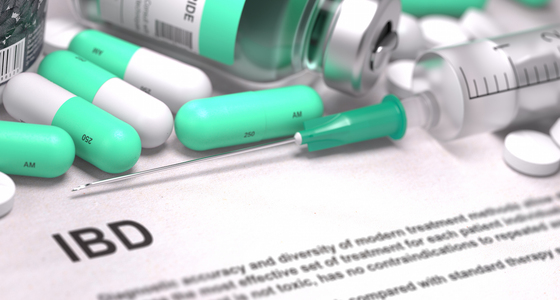Can having inflammatory bowel disease impact your menstrual cycle (periods)? In this article, we take a look….

Note: This article will use the terms 'female', 'women' and 'girls' to refer to sex assigned at birth.
Periods (menstruation) are a normal part of puberty and growing up. Typically, girls' periods first start between the ages of eight and 13-years-old. However, in a study of women with Crohn’s disease, nearly three-quarters got their period at or after age 16-years-old1. This article explores the impact of inflammatory bowel disease (IBD) on periods.

IBD can affect when a girl’s period or menstrual cycle starts, which may be due to the disease delaying the onset of puberty and causing a slower growth and development rate. The signs of delayed puberty in girls include not starting periods within five years of when breasts begin to grow or by the age of 16-years-old. You can read more about how IBD can affect puberty here.
Other reasons why periods may start later are:
Disease activity and inflammation
Insufficient nutrient intake slowing down growth and development and contributing to low weight gain
Medication, such as steroids
In a study2 from 2015, researchers found an increased risk of irregular periods when taking steroid medication for IBD. However, short courses of steroids are often prescribed initially to lessen the risk of other effects. The study also suggested that those who were taking either an anti-TNF medication (such as infliximab, golimumab and adalimumab) or a thiopurine (such as mercaptopurine or azathioprine) along with a steroid did not have the same risk. Talk to your doctor or IBD nurse if your periods are affected by taking steroids.
Regarding medication affecting period symptoms, another study3 looking into changes in bowel habits during menstruation in IBD patients found that those females receiving biologic medication experienced increased nervousness, irritability, pelvic pain, fatigue, and swollen legs before and during their period.

The 2015 study2 also found that 25% of IBD patients experienced frequent fluctuations in their periods in the year leading up to their IBD diagnosis. These fluctuations included:
Length of menstrual cycle and time between cycles (periods were closer together, further apart, or irregular)
Duration of flow
The amount of flow became heavier or lighter
Increased period pain
It was also found that changes in periods may be experienced during the early stages of IBD. Periods may become more irregular, where they are closer together or further apart and may even stop altogether for a period of time. This can be due to several reasons including stress, fluctuations in hormones, and weight loss.

The fluctuation in hormones before a period starts, referred to as the premenstrual phase, and when you are having your period may make IBD symptoms worse for some people. A study4 from 2020 showed that over half of the females with IBD had worsening IBD symptoms with their menstrual period, before and during it. These included stomach pain, fatigue, and diarrhoea. A change in bowel habits during menstruation was reported by 72% of Crohn’s disease patients and 56% of those with ulcerative colitis (UC)4, where if you have IBD you are more likely to experience diarrhoea during your period than the general population. With Crohn's disease specifically, you are more likely to also get diarrhoea in the premenstrual phase.

If you have started your periods, it may be helpful to keep track of them. This will help to record any patterns and irregularities and will be helpful when talking to your doctor who can evaluate your IBD and menstrual symptoms. You could chart when your period starts; how long your period lasts, what the flow is like, how many sanitary pads, cups, tampons, etc are needed, what symptoms you experience in the premenstrual cycle and during your period, and the duration of time between periods. There are several period tracker apps that can help with charting your periods.
The 2015 study2 found that menstrual cycles typically become more regular over time. And for younger females who haven’t yet started their periods, once their disease is in remission, their periods are more likely to start. The study also proposed that women who develop IBD whose periods are already established may face specific stressors like stress, fluctuations in hormones, and weight loss that impact their menstrual cycles, during the early stages of their condition. However, as time progresses, and these stressors tend to diminish through remission, it will lead to an improvement and return to menstruation regularity. However, the study does state that further research is required to ascertain whether the occurrence of these stressors varies between females who are recently diagnosed and those with long-standing IBD, and whether they have an impact on the menstrual cycle.
Don’t feel embarrassed to check in with your doctor if you’re experiencing changes to your periods and your IBD symptoms are worse. It’s important to discuss any changes, however, minor or severe in order to rule out any other underlying conditions. Sharing all of the information you’ve tracked will be a useful tool in explaining to your doctor what is happening. It will help your doctor assess if your period issues coincide with being in an IBD flare or if it’s the medication that is problematic or you’re malnourished etc. Your doctor may refer you to a gynaecologist, or a nutritionist and other specialists to help manage your symptoms.
Girls with Guts have several factsheets on women's health with IBD, including information on menstruation, sexual health and family planning.
1. DeBoer MD, Denson LA. Delays in puberty, growth, and accrual of bone mineral density in pediatric Crohn's disease. J Pediatr. 2013;163:17-22.
2. Saha, S., Zhao, Y., Shah, S. A., Esposti, S. D., Lidofsky, S., Salih, S., Bright, R., Law, M., Moniz, H., Flowers, N., Merrick, M., & Sands, B. E. (2014). Menstrual Cycle Changes in Women with Inflammatory Bowel Disease: A Study from the Ocean State Crohn's and Colitis Area Registry. Inflammatory Bowel Diseases, 20(3), 534-540. https://doi.org/10.1097/01.MIB.0000441347.94451.cf
3. Change in bowel habits during menstruation: are IBD patients different? Adi Lahat https://orcid.org/0000-0003-1513-7280 zokadi@gmail.com, Alona Falach-Malik, Shomron Ben- Horin https://doi.org/10.1177/1756284820929806
4. Sheila D. Rustgi, Maia Kayal, and Shailja C. Shah. Sex-based differences in inflammatory bowel diseases: a review. Therap Adv Gastroenterol. 2020; 13: 1756284820915043. Published online 2020 Apr 28. doi: 10.1177/1756284820915043 PMCID: PMC7236567 PMID: 32523620

